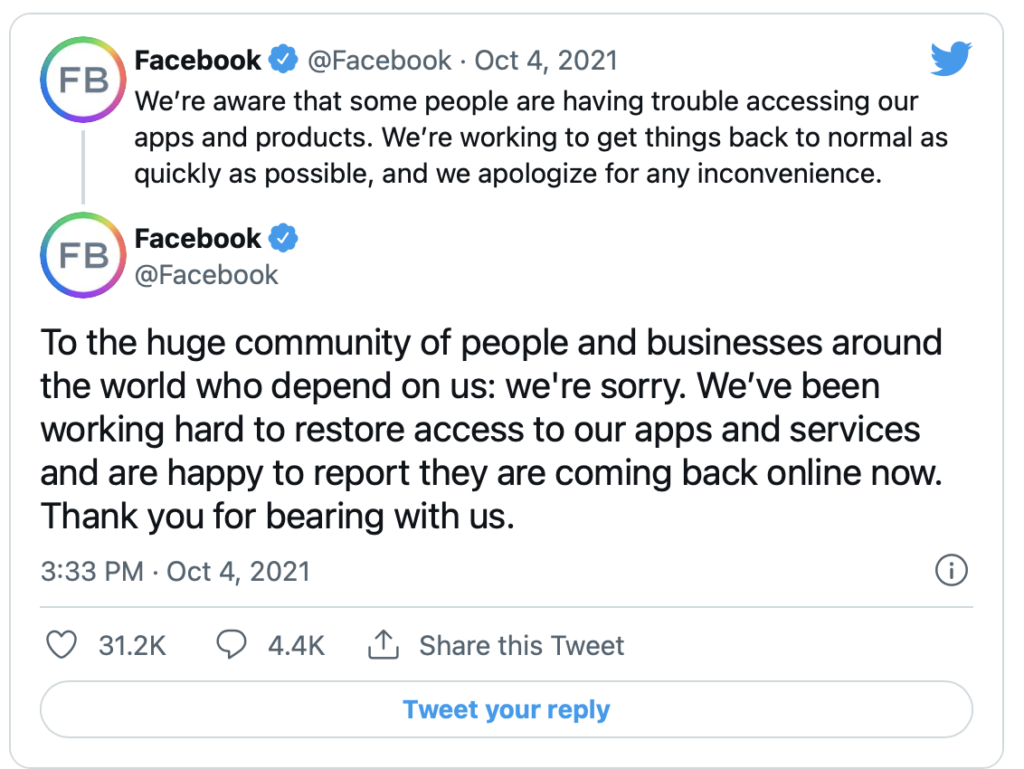The importance of being prepared for a crisis!
By Amanda Brooks
Last week on Monday, October 4, Facebook, Instagram, and WhatsApp went down for six hours and three billion people were affected from all corners of the world. Facebook went down for a bit on Thursday, October 8 as well.
“I don’t know If I’ve seen an outage like this before from a major internet firm,” said Doug Madory, director of internet analysis at network monitoring firm Kentik.
“To the huge community of people and businesses around the world who depend on us: we’re sorry,” it said. “We’ve been working hard to restore access to our apps and services and are happy to report they are coming back online now. Thank you for bearing with us.”
Security experts pointed to a Domain Name System (DNS) problem as a possible source of the issue. Around 1 pm ET, Cisco’s internet analysis division ThousandEyes said on Twitter that the outage was a result of an ongoing DNS failure. The DNS translates website names into IP addresses that can be read by a computer. It’s often called the “phonebook of the internet.”
As Facebook came back online, Facebook CEO Mark Zuckerberg posted to his Facebook page. “Facebook, Instagram, WhatsApp and Messenger are coming back online now,” he wrote. “Sorry for the disruption today — I know how much you rely on our services to stay connected with the people you care about.”

Whistleblower:
Facebook has been in trouble for weeks because of whistle-blower, Frances Haugen, a former Facebook product manager who amassed thousands of pages of internal research. At a Senate hearing on Sept. 30, Sen. Richard Blumenthal pressed Facebook global head of safety Antigone Davis on Facebook-owned Instagram and the platform’s potential negative impact on children, particularly young girls. On Sunday, “60 Minutes” aired a segment in which Facebook whistleblower Frances Haugen claimed the company is aware of how its platforms are used to spread hate, violence and misinformation, and that Facebook has tried to hide that evidence. Facebook has pushed back on those claims.
Importance of Crisis Communications:
Technology outages are common. More than 3.5 billion people around the world use Facebook, Instagram, Messenger and WhatsApp to communicate with friends and family, share political messages, and market their businesses.
“With Facebook being down we’re losing thousands in sales,” said Mark Donnelly, a start-up founder in Ireland who runs HUH Clothing, a fashion brand focused on mental health that uses Facebook and Instagram to reach customers. “It may not sound like a lot to others, but missing out on four or five hours of sales could be the difference between paying the electricity bill or rent for the month.”
As one adverse scenario leads to another, the overall culture, mission and values of businesses rapidly become destroyed as information is interpreted (or misinterpreted) by the public. Check out Milldam’s Crisis Communications Plan on the website to be prepared to implement data center crisis management!
The following are a few preventative strategies that can be implemented to solve ongoing PR crises and strengthen corporate messaging:
- Employ a gatekeeper
- Keep your social statements brief
- Honesty and Explanation
While we never start the day expecting a disaster to unfold, it’s inevitable that a crisis will arise at some point in the future; whether it’s a downtime event, security breach, or something completely out of our control like a weather event of some kind. How your organization communicates during this tumultuous time can shape your company’s reputation in the industry for years to come. With locations in Los Angeles and Boston, Milldam is well equipped to provide crisis communications services throughout the country.
Get started on your organization’s data center crisis communications plan today!



